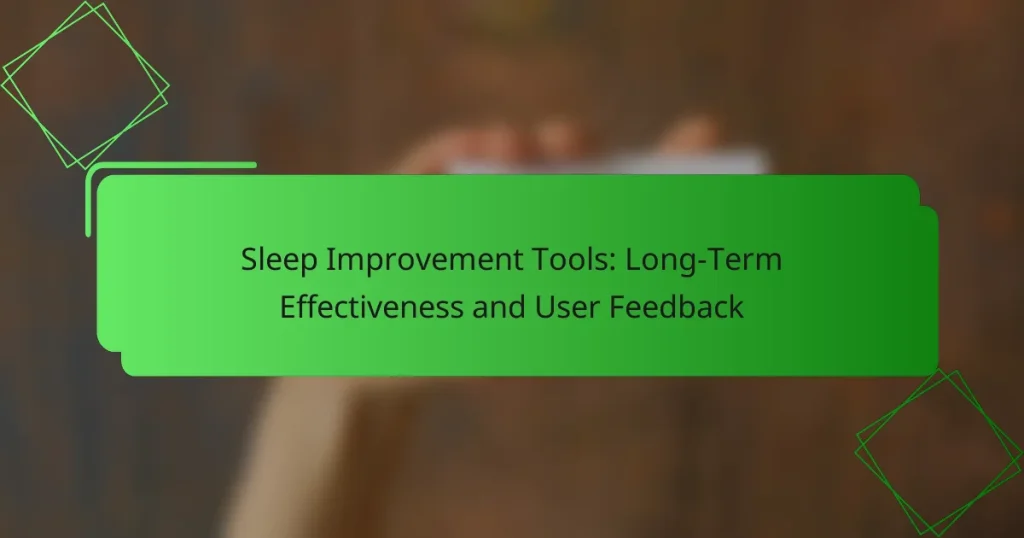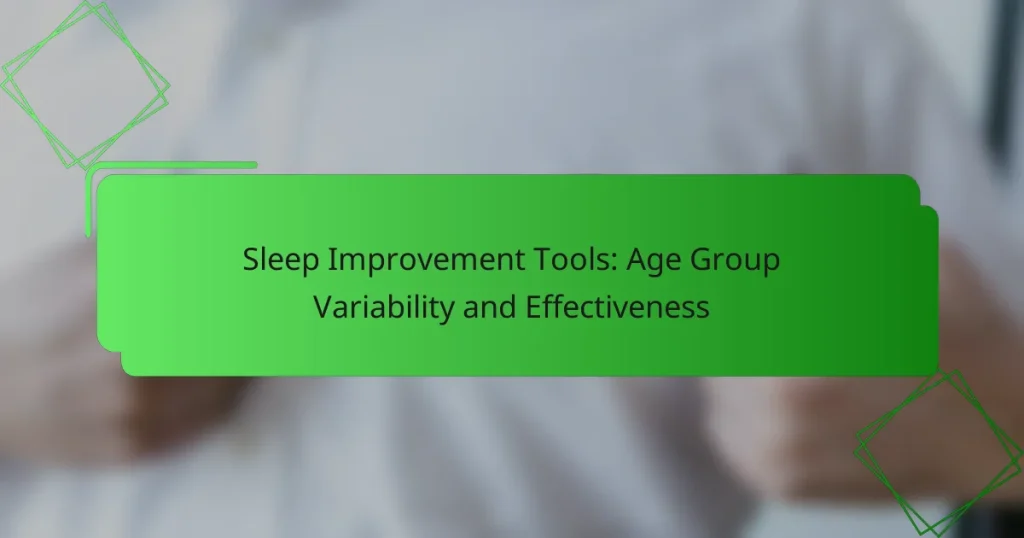Digital wellness tools for sleep improvement offer a range of applications designed to enhance sleep quality through personalized strategies and insights. By utilizing technology for sleep tracking and relaxation techniques, these tools help users establish healthier sleep habits and better understand their sleep patterns. When choosing a sleep improvement tool, it’s essential to consider usability, connectivity, and scientific validation to ensure effective results.
Sleep Improvement Tools: User Reviews, Results and Satisfaction
Sleep Tracking Apps: Measurement, Effectiveness and Insights
Sleep Improvement Tools: Age Group Variability and Effectiveness
Sleep Improvement Tools: Effectiveness, User Satisfaction and Results
Sleep Improvement Tools: Shift Workers, Adaptability and Effectiveness
Sleep Improvement Tools: Science, Mechanisms and Effectiveness
What are the best digital wellness tools for sleep improvement?
The best digital wellness tools for sleep improvement include a variety of apps and programs designed to enhance sleep quality through relaxation techniques, sleep tracking, and personalized guidance. These tools can help users establish better sleep habits and understand their sleep patterns.
Calm app
The Calm app focuses on mindfulness and relaxation techniques to improve sleep quality. It offers guided meditations, sleep stories, and soothing music, which can help users unwind before bedtime. Many users find that incorporating these calming practices into their nightly routine can significantly enhance their ability to fall asleep.
Consider using the app’s sleep stories, which are designed to lull you to sleep with gentle narration and calming soundscapes. The app is available on a subscription basis, with a free trial to explore its features.
Headspace app
Headspace is another popular app that combines meditation with sleep improvement. It provides a range of sleepcasts, which are audio experiences designed to help users relax and drift off. The app also includes mindfulness exercises that can be practiced during the day to promote better sleep at night.
Headspace offers a subscription model, allowing users to access its full library of content. Many users appreciate the structured approach to meditation, which can lead to improved sleep quality over time.
Sleep Cycle app
Sleep Cycle is a sleep tracking app that analyzes your sleep patterns and wakes you up during your lightest sleep phase. This approach can help you feel more refreshed in the morning. The app uses your phone’s sensors to monitor your sleep movements and provides insights into your sleep quality.
With features like sleep analysis and personalized recommendations, Sleep Cycle can help you identify factors affecting your sleep. The app is available for a one-time purchase or through a subscription for additional features.
Pillow app
Pillow is a sleep tracking app that offers detailed insights into your sleep cycles and quality. It uses advanced algorithms to analyze your sleep data and provides personalized recommendations to improve your sleep habits. The app also includes a smart alarm feature to wake you up at the optimal time.
Pillow offers a free version with basic features, while the premium version unlocks advanced analytics and additional tools. Users appreciate the intuitive interface and the ability to track naps as well.
Sleepio program
Sleepio is an online sleep improvement program based on cognitive behavioral therapy for insomnia (CBT-I). It provides a structured, interactive course that helps users identify and change thoughts and behaviors that negatively impact sleep. The program includes personalized sleep plans and progress tracking.
Sleepio is subscription-based, and many users find it effective for addressing chronic sleep issues. The program’s evidence-based approach makes it a reliable option for those seeking long-term improvements in their sleep quality.
How do sleep improvement tools enhance sleep quality?
Sleep improvement tools enhance sleep quality by providing personalized strategies and insights that help users develop better sleep habits. These tools often utilize technology to track sleep patterns, guide relaxation techniques, and create tailored plans to address individual sleep challenges.
Guided meditation
Guided meditation helps users relax and prepare for sleep by leading them through calming exercises and visualizations. These sessions can reduce anxiety and stress, making it easier to fall asleep. Many apps offer a variety of guided meditations, ranging from a few minutes to longer sessions, allowing users to choose what fits their needs.
To maximize the benefits, consider setting a regular time for meditation before bed. This consistency can signal to your body that it’s time to wind down, enhancing the overall effectiveness of the practice.
Sleep tracking
Sleep tracking tools monitor various aspects of your sleep, including duration, quality, and cycles. By analyzing this data, users can identify patterns and factors affecting their sleep, such as lifestyle choices or environmental conditions. Many devices and apps provide insights into sleep stages, helping users understand their sleep architecture.
When using sleep trackers, aim for a minimum of one week of data collection to establish reliable patterns. Be aware of common pitfalls, such as over-reliance on technology or misinterpretation of data, which can lead to unnecessary anxiety about sleep.
Personalized sleep plans
Personalized sleep plans are tailored strategies based on individual sleep habits, preferences, and challenges. These plans often include recommendations for bedtime routines, sleep environment adjustments, and lifestyle changes to improve sleep quality. Many apps and platforms offer assessments to create these customized plans.
To create an effective sleep plan, consider factors such as your typical sleep schedule, daily activities, and any specific sleep issues you face. Regularly review and adjust your plan based on your progress and changing needs to ensure continued improvement in your sleep quality.
What features should I look for in sleep improvement tools?
When selecting sleep improvement tools, prioritize features that enhance usability, connectivity, and credibility. Look for user-friendly interfaces, compatibility with wearable devices, and scientific validation to ensure effective sleep management.
User-friendly interface
A user-friendly interface is crucial for sleep improvement tools, as it encourages consistent use. Look for apps or devices that offer intuitive navigation, clear visuals, and easy access to features. A simple design can help you quickly track your sleep patterns without frustration.
Consider tools that provide customizable settings, allowing you to tailor notifications and reminders according to your preferences. This personalization can enhance your engagement and commitment to improving your sleep habits.
Integration with wearables
Integration with wearables is an important feature for sleep improvement tools, as it allows for comprehensive tracking of sleep metrics. Devices like smartwatches and fitness trackers can monitor heart rate, movement, and sleep stages, providing valuable data for analysis.
Choose tools that seamlessly sync with popular wearables, enabling you to consolidate your health information in one place. This connectivity can help you identify patterns and make informed adjustments to your sleep routine.
Scientific backing
Scientific backing is essential for the credibility of sleep improvement tools. Look for products that reference peer-reviewed studies or are developed in collaboration with sleep experts. This ensures that the methods used are based on proven research rather than anecdotal evidence.
Tools that provide insights grounded in science can offer more reliable recommendations for improving sleep quality. Always check for certifications or endorsements from recognized health organizations to validate the effectiveness of the tool you choose.
What are the costs of popular sleep improvement tools?
The costs of popular sleep improvement tools vary widely, often depending on subscription models or one-time purchases. Many apps offer free versions with limited features, while premium subscriptions can range from low monthly fees to more substantial annual costs.
Calm subscription pricing
Calm offers a subscription model with a monthly fee of around $14.99 or an annual fee of approximately $69.99, which provides access to a wide range of sleep stories, meditations, and relaxation music. Users can also take advantage of a free trial to explore the app’s features before committing.
For those looking for a family plan, Calm offers a subscription that allows up to five members for about $99.99 per year, making it a cost-effective option for households interested in improving their collective sleep quality.
Headspace subscription pricing
Headspace operates on a similar subscription basis, charging about $12.99 per month or $69.99 annually. The subscription includes access to guided meditations, sleep sounds, and courses specifically designed to enhance sleep quality.
Headspace also provides a free version with limited content, allowing users to try out the app before deciding on a paid subscription. Additionally, discounts may be available for students or those who commit to longer-term plans.
Sleep Cycle premium features
Sleep Cycle offers a free version that tracks sleep patterns, but its premium features come at a cost of around $29.99 per year. Premium users gain access to advanced sleep analysis, personalized sleep aids, and the ability to track sleep trends over time.
For those considering Sleep Cycle, the premium subscription can be beneficial for users who want detailed insights into their sleep habits and tailored recommendations for improvement. A free trial is typically available, allowing potential subscribers to evaluate the premium features before purchase.
What are user reviews saying about sleep improvement tools?
User reviews indicate that sleep improvement tools are generally effective in enhancing sleep quality and duration. Many users report positive experiences with various apps and devices, highlighting features that promote relaxation and better sleep hygiene.
Common Features of Sleep Improvement Tools
Sleep improvement tools often include features such as sleep tracking, relaxation exercises, and guided meditations. Users appreciate tools that provide insights into their sleep patterns, allowing them to identify factors affecting their rest.
Many apps also offer customizable soundscapes or white noise options to help users fall asleep faster. These features are particularly popular among individuals who struggle with environmental noise or anxiety at bedtime.
User Experiences and Effectiveness
Reviews frequently mention that sleep improvement tools can lead to noticeable changes in sleep quality. Users often report falling asleep more quickly and waking up feeling more refreshed after using these tools consistently.
However, effectiveness can vary based on individual preferences and habits. Some users find that specific features resonate more with them, while others may not experience significant benefits.
Considerations When Choosing a Tool
When selecting a sleep improvement tool, consider factors such as ease of use, compatibility with your devices, and specific features that align with your sleep goals. Reading user reviews can provide insights into which tools are most effective for different needs.
Additionally, look for tools that offer a free trial or a money-back guarantee, allowing you to test their effectiveness without a financial commitment. This approach can help you find the best fit for your sleep improvement journey.





